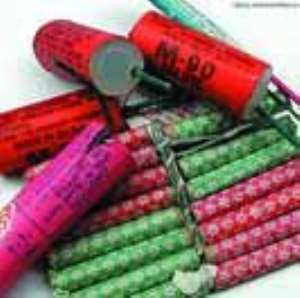
An illicit market in firecrackers is thriving in the country, in clear violation of Executive Instrument (EI) 21 which prohibits the manufacture, possession or carrying of firecrackers in the country..
Firecrackers, variously referred to as knockout, display shells, artillery shells and ball and canister shells, were prohibited in 1999 for the danger they posed to public safety and the panic their use often created during Christmas and the New Year festivities.
Concerns over the availability of the items in the country have been heightened following last week's explosion at a warehouse at Anyaa, a suburb of Accra. There is also trepidation that they could be used to cause mischief during the December elections.
In the aftermath of that explosion, a market survey conducted by the Daily Graphic revealed that although firecrackers were no longer displayed as brazenly as they were prior to the ban, dealers in the products were cashing in on the festive and political season to sell the banned products.
Some of the firecrackers purchased by the Daily Graphic were “Silber Bluten”, “M-100”, “Pili Cracker”, “POP” and one other with the inscription in Chinese.
M-100 has the warning: “Flammable rocket with report. Use only under close adult supervision. For outdoor use only. Place in wooden trough or iron pipe at 75 degree angle pointing away from people or flammable material. Do not hold in hand. Light fuse and get away. This rocket travels at high speeds and can travel long distances. Misuse may result in injury or fire.”
Most of the crackers have 'Made in China' labels, indicating their country of origin.
Some of the dealers the Daily Graphic spoke to, all of whom were women, were aware of the ban but said they could not put a stop to the trade because it fetched a lot of money during Christmas.
They said they had suppliers who brought them from China and added that most of those suppliers were Chinese.
They were, however, not able to tell how the Chinese suppliers brought them into the country.
Persistent questions, however, made some of them uncomfortable and suspicious.
“Please go away. We have been warned not to sell them. I will not sell to you anymore. Take your money back and go away,” one of the dealers, an old woman who appeared to be in her late 60s, told our reporter.
Reacting, the Police Public Relations Director, Deputy Superintendent of Police (DSP) Kwasi Ofori, said the ban on firecrackers was still in force and added that people who had them in their homes, warehouses and shops were under an obligation to hand them over to the police.
He said the Police Administration took a serious view of the situation and that personnel would soon go round the markets and seize the products and also prosecute the dealers.
Asked if the Customs, Excise and Preventive Service (CEPS) was aware of the smuggling in of firecrackers, the Deputy Commissioner in charge of Preventive at CEPS, Mr Ernest Samuel Ackwerh, replied in the negative.
He said the service had not intercepted any firecrackers, noting that with the kind of frontiers the country had, goods could be smuggled in without the notice of CEPS officials.
He said CEPS was taken aback when the explosion occurred at the warehouse at Anyaa recently and added that efforts would be intensified to ascertain how the firecrackers came into the country.
Story By Mark-Anthony Vinorkor




 We’ll no longer tolerate your empty, unwarranted attacks – TUC blasts Prof Adei
We’ll no longer tolerate your empty, unwarranted attacks – TUC blasts Prof Adei
 Bawumia donates GHc200,000 to support Madina fire victims
Bawumia donates GHc200,000 to support Madina fire victims
 IMF to disburse US$360million third tranche to Ghana without creditors MoU
IMF to disburse US$360million third tranche to Ghana without creditors MoU
 Truck owner share insights into train collision incident
Truck owner share insights into train collision incident
 Paramount chief of Bassare Traditional Area passes on
Paramount chief of Bassare Traditional Area passes on
 Two teachers in court over alleged illegal possession of BECE papers
Two teachers in court over alleged illegal possession of BECE papers
 Sunyani: Victim allegedly shot by traditional warriors appeals for justice
Sunyani: Victim allegedly shot by traditional warriors appeals for justice
 Mahama vows to scrap teacher licensure exams, review Free SHS policy
Mahama vows to scrap teacher licensure exams, review Free SHS policy
 Government will replace burnt Madina shops with a new three-story, 120-store fac...
Government will replace burnt Madina shops with a new three-story, 120-store fac...
